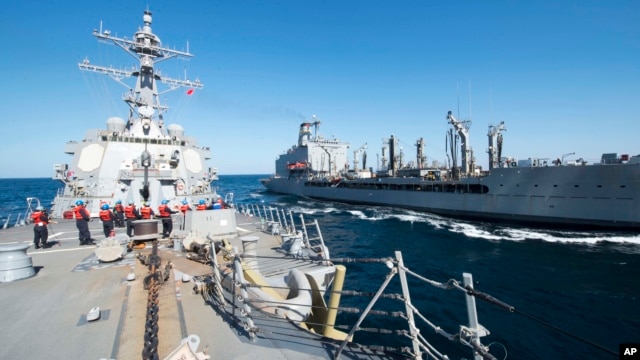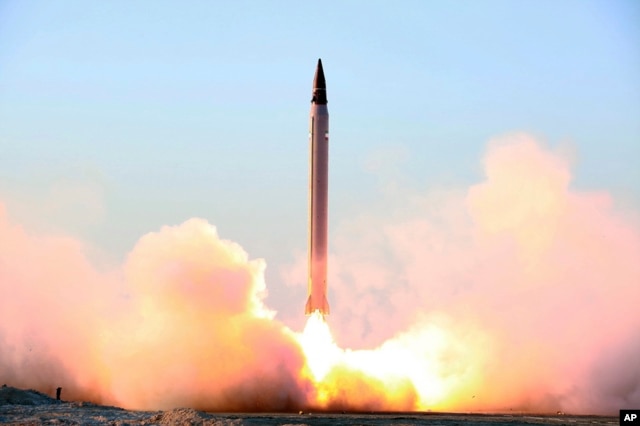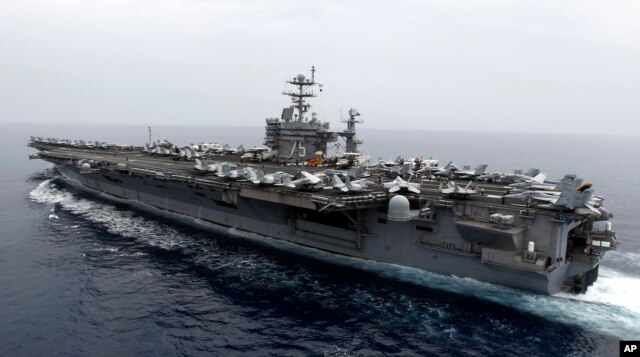Iran Warns Against New 'Illegal' US Sanctions
News / Middle East
Iran Warns Against New 'Illegal' US Sanctions
FILE - Guided-missile destroyer USS Bulkeley participates in a replenishment-at-sea with fleet replenishment oiler USNS John Lenthall in the Gulf of Oman. Iranian naval vessels conducted rocket tests last week near the USS Harry S. Truman aircraft carrier
December 31, 2015 5:37 AM
Iran said Thursday it would respond to any "interventionist" measures by the United States, after U.S. officials said the Treasury Department was preparing new sanctions connected to Iran's ballistic missile program.
Iranian Foreign Ministry spokesman Hossein Jaber Ansari called the planned sanctions "unilateral, arbitrary and illegal."
The Wall Street Journal, which first reported the planned move, said the sanctions will likely be formally announced this week and include about 12 people and companies in Iran, Hong Kong and the United Arab Emirates.
The sanctions would call on U.S. banks to freeze the assets of those on the list and bar individuals and companies in the U.S. from doing business with them, according to the Journal.
Iran test-fired missiles in October and November. The U.S. and France said the October launch violated a U.N. Security Council resolution banning Iranian development of a ballistic missile. Iran rejected the allegations, saying the sanctions only applied to missiles capable of carrying a nuclear warhead and that their missiles had no such capability.
This photo released by the official website of the Iranian Defense Ministry on Sunday, Oct. 11, 2015, claims to show the launching of an Emad long-range ballistic surface-to-surface missile in an undisclosed location.
U.S. experts said the only purpose of the missile would be to deliver a nuclear warhead.
"We've been looking for some time at options for additional actions related to Iran's ballistic missile program based on our continued concerns about its activities, including the October 10th launch," an Obama administration official said. "We are considering various aspects related to additional designations, as well as evolving diplomatic work that is consistent with our national security interests."
Deal violation
Iran has previously warned that imposing new sanctions would be a violation of the nuclear agreement the country signed in July with the United States, Britain, China, France, Russia and Germany.
Under that deal, Iran is curbing its nuclear activity in response to allegations it was working on nuclear weapons, and in return will get relief from sanctions that have badly hurt its economy. Those sanctions can be lifted once the U.N.'s nuclear watchdog certifies Iran has taken its required steps, including reducing its stockpile of enriched uranium and the number of centrifuges it has installed.
Iran has long denied its nuclear program had any military dimension.
Iranian Revolutionary Guards spokesman Ramezan Sharif also denied Thursday U.S. allegations that Iran test-fired missiles that passed near an American aircraft carrier Saturday in the Strait of Hormuz.
Sharif called the report "psychological warfare" and said the navy had not conducted any exercises in the past week.
U.S. military officials said the missiles passed within 1,500 meters of the aircraft carrier USS Harry S. Truman. The officials, who spoke to Western media under condition of anonymity, said Iran's navy gave a radio announcement before firing the missiles, telling ships to steer clear of the area.
FILE - A general view shows the nuclear-powered aircraft carrier USS Harry S. Truman at an undisclosed position in the Mediterranean Sea.
Several other ships were also in the region, including the destroyer USS Bulkeley, a French frigate and merchant ships.
None of the missiles were fired at any of the ships, which did not need to take any evasive actions.
"While most interactions between Iranian forces and the U.S. Navy are professional, safe and routine, this event was not and runs contrary to efforts to ensure freedom of navigation and maritime safety in the global commons," U.S. Central Command spokesman Kyle Raines said in an emailed statement to Reuters.
The strategic Persian Gulf waterway, which sees nearly a third of all oil traded by sea pass through it, has been the scene of past confrontations between the U.S. and Iran, including a one-day naval battle in 1988.




Comments